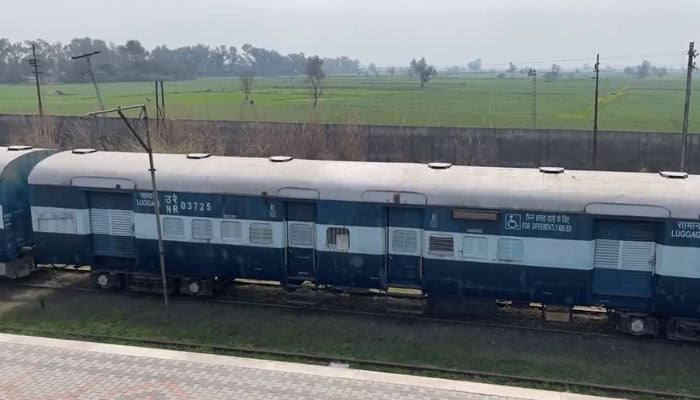11 bogies of Samjhauta Express rust in Pakistan, thanks to Indian obduracy
Pakistan had asked India to bring its locomotive and withdraw its bogies from the Wagah railway station
LAHORE: It has been more than five years since the Samjhauta Express, a train running between Pakistan and India, was closed, but the last train has not yet reached India and eleven coaches of the train are still standing at the Wagah railway station in the Pakistani territory.
Wagah Railway Station manager Muhammad Azhar said on August 5, 2019, when India illegally changed the status of occupied Kashmir, Pakistan immediately shut down the Samjhauta Express.
At that time, eleven coaches of the Indian train were present in Lahore and 16 coaches of Pakistani train remained in India, which are still at the Attari railway station.
Pakistan had asked India to bring its locomotive and withdraw its bogies from the Wagah railway station.
According to the railway agreement with India, it was decided that for six months from July to December, the train with Indian bogies will come to Pakistan and the engine will be from Pakistan, while for the remaining six months from January to June, there will be Pakistani bogies. But when the train service was suspended, Indian bogies were in Pakistan.
Pakistan has sent a message to India several times that these bogies will be pushed to Indian territory and India should take back the bogies with its engine.
But India is stubborn that according to the agreement, Pakistan will return the bogies to India with Pakistani engine.
Currently, Indian bogies are standing at the Wagah railway station and are getting damaged, but due to India’s stubbornness, they cannot be returned.
-
 Rising Energy Costs Put UK Manufacturing Competitiveness At Risk, Industry Groups Warn
Rising Energy Costs Put UK Manufacturing Competitiveness At Risk, Industry Groups Warn -
 Kate Middleton Makes Glitzy Return To BAFTAs After Cancer Diagnosis
Kate Middleton Makes Glitzy Return To BAFTAs After Cancer Diagnosis -
 NFL Star Rondale Moore Dies Aged 25, Minnesota Vikings Pay Tribute
NFL Star Rondale Moore Dies Aged 25, Minnesota Vikings Pay Tribute -
 Kim Kardashian Makes Huge Career Move Weeks After Going Public With Lewis Hamilton
Kim Kardashian Makes Huge Career Move Weeks After Going Public With Lewis Hamilton -
 Shia LaBeouf Draws Attention For Sweet Reason After Spending Time In Jail Over Brawl Incident Amid Mardi Gras Bash
Shia LaBeouf Draws Attention For Sweet Reason After Spending Time In Jail Over Brawl Incident Amid Mardi Gras Bash -
 Princess Eugenie, Beatrice Receive Strong Warning After Andrew Arrest: 'Zero Tolerance'
Princess Eugenie, Beatrice Receive Strong Warning After Andrew Arrest: 'Zero Tolerance' -
 Rihanna 38th Birthday Detail Breaks The Internet, Featuring Unexpected Huge Item
Rihanna 38th Birthday Detail Breaks The Internet, Featuring Unexpected Huge Item -
 Liza Minnelli Recalls Rare Backstage Memory With Mum Judy Garland In New Memoir
Liza Minnelli Recalls Rare Backstage Memory With Mum Judy Garland In New Memoir -
 Armed Intruder Shot Dead At Trump's Mar-a-Lago Residence: US Secret Service
Armed Intruder Shot Dead At Trump's Mar-a-Lago Residence: US Secret Service -
 Total Lunar Eclipse: What You Need To Know And Where To Watch
Total Lunar Eclipse: What You Need To Know And Where To Watch -
 Timothee Chalamet Admits To Being Inspired By Matthew McConaughey's Performance In 'Interstellar'
Timothee Chalamet Admits To Being Inspired By Matthew McConaughey's Performance In 'Interstellar' -
 'Determined' Savannah Guthrie Plans To Honour Her Mother Nancy With Major Move: 'It's Going To Be Emotional'
'Determined' Savannah Guthrie Plans To Honour Her Mother Nancy With Major Move: 'It's Going To Be Emotional' -
 Train's Pat Monahan Blows The Lid On 'emotional' Tale Attached To Hit Song 'Drops Of Jupiter'
Train's Pat Monahan Blows The Lid On 'emotional' Tale Attached To Hit Song 'Drops Of Jupiter' -
 Kurt Russell Spills The Beans On His Plans For Milestone Birthday This Year: 'Looking Forward To It'
Kurt Russell Spills The Beans On His Plans For Milestone Birthday This Year: 'Looking Forward To It' -
 PayPal Data Breach Exposed Sensitive User Data For Six-month Period; What You Need To Know
PayPal Data Breach Exposed Sensitive User Data For Six-month Period; What You Need To Know -
 Prince William Receives First Heartbreaking News After Andrew Arrest
Prince William Receives First Heartbreaking News After Andrew Arrest




